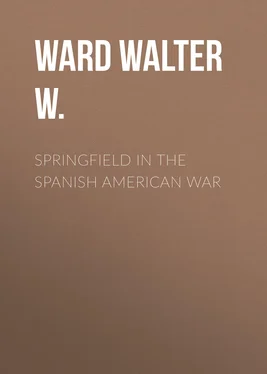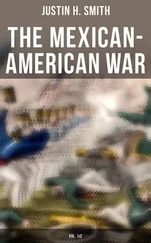Walter W. Ward - Springfield in the Spanish American War
Здесь есть возможность читать онлайн «Walter W. Ward - Springfield in the Spanish American War» — ознакомительный отрывок электронной книги совершенно бесплатно, а после прочтения отрывка купить полную версию. В некоторых случаях можно слушать аудио, скачать через торрент в формате fb2 и присутствует краткое содержание. Жанр: foreign_prose, История, foreign_edu, foreign_antique, на английском языке. Описание произведения, (предисловие) а так же отзывы посетителей доступны на портале библиотеки ЛибКат.
- Название:Springfield in the Spanish American War
- Автор:
- Жанр:
- Год:неизвестен
- ISBN:нет данных
- Рейтинг книги:3 / 5. Голосов: 1
-
Избранное:Добавить в избранное
- Отзывы:
-
Ваша оценка:
- 60
- 1
- 2
- 3
- 4
- 5
Springfield in the Spanish American War: краткое содержание, описание и аннотация
Предлагаем к чтению аннотацию, описание, краткое содержание или предисловие (зависит от того, что написал сам автор книги «Springfield in the Spanish American War»). Если вы не нашли необходимую информацию о книге — напишите в комментариях, мы постараемся отыскать её.
Springfield in the Spanish American War — читать онлайн ознакомительный отрывок
Ниже представлен текст книги, разбитый по страницам. Система сохранения места последней прочитанной страницы, позволяет с удобством читать онлайн бесплатно книгу «Springfield in the Spanish American War», без необходимости каждый раз заново искать на чём Вы остановились. Поставьте закладку, и сможете в любой момент перейти на страницу, на которой закончили чтение.
Интервал:
Закладка:
All the line officers and 75 per cent. of our men in the militia had come with us while there were more than enough "rookies" to fill out the quota. The recruits were, some of them, in uniform and a number had formerly been in the militia service, so that they took kindly enough to the opening of camp life. But as the militia companies had only been composed of 58 enlisted men there were not uniforms enough at the time to equip the extra men and some of the "rookies" looked odd and felt it in their civilian attire. More than one practical joke was played upon them before "taps" sounded, but the great majority of the men were tired enough to get to quarters and hug their luxurious mattresses before the bugles sounded the last call of the day.
Of the field and staff and non-commissioned staff resident in Springfield and vicinity not all came to camp. Col. Clark and Major Southmayd were on hand as was Lt. Paul R. Hawkins, the regimental adjutant. Quartermaster Colson of Holyoke did not come and to his place was appointed Corporal E. E. Sawtell of K company. Major Brown of Adams, the regimental surgeon and Lt. J. T. Hendrick of Springfield, assistant surgeon did not volunteer and a new surgical staff was appointed, consisting of Dr. Henry T. Bowen of Springfield as major and surgeon, Dr. Ernest A. Gates of Springfield and Dr. John S. Hitchcock of Amherst as assistant surgeons with the rank of first lieutenants. Dr. Hitchcock was a member of I company when appointed.
There were several changes in the non-commissioned staff. Corporal Robert N. Ingersoll was made sergeant-major vice Paul Norton and Ross L. Lusk quartermaster-sergeant vice Melville Snow of Holyoke. Three hospital stewards instead of one were assigned to the regiment, and the appointees were Ulysses G. Fortier of Holyoke, S. H. Greenberg of Boston and Edson P. Howes of Springfield. No color sergeants were provided for in the volunteer regiments and these positions were filled by detail.
It was a matter of much regret that no place was provided for the paymaster and inspector of rifle practice. In the Second as a militia regiment these positions had been filled respectively by Lieut. A. C. Edson of Holyoke and A. E. Taylor of Chicopee Falls but no such positions were provided for in the volunteer service and these officers were forced to remain behind.
The first guard mount of the camp was held in the afternoon with First Lieut. P. C. Powers of K company as officer of the guard. So closed our first day at South Framingham.
CHAPTER IV
WHEREIN IS TOLD HOW WE WERE TRANSFORMED FROM "TIN" SOLDIERS INTO THE REAL ARTICLE
IT did not require many day's of camp life at South Framingham to convince about all of us that we were there strictly for business. The weather was rather cold and there were a few flurries of snow although it was in May. The nights were so cool that huge fires of wood were built on the color line each night and around these the men gathered spending the time in singing, story telling and in wondering how soon we would start for the front and just what part we of the Second would take in subduing the pride of the haughty Spaniard.
But little in the way of drilling was done at first, but after a day or two the work of whipping the "rookies" into shape was begun, the process being the simple one of having them fall in with the company and learning the drill as best they could. Squad drills were also carried on and it was during these that the raw material was best worked up.
Hardly had the regiment arrived in camp before regulation United States army blankets were issued to the men and issues of rubber blankets, "working suits" of brown canvas followed.
Private Pomeroy of K company was the first of the Springfield men to be taken ill. He had not been feeling well before leaving home but pluckily made up his mind to go with his company just the same, and would not admit his illness. Soon after arriving in camp his condition became so serious that the surgeon was called to him and Pomeroy was found to be suffering with tonsilitis. He was removed from the camp to a hospital in South Framingham, but while there scarlet fever developed and he was sent home as soon as he had recovered sufficiently to be able to travel. Pomeroy felt much worse over his inability to go with his regiment than he did over his illness, serious as it was.
The physical examinations soon made many sore hearts among the boys in camp, although the results of some of them were extremely satisfactory to the parents, relatives or friends of some of the would be soldiers. They were in charge of Capt. Bushnell U. S. A., who was assisted by the surgeons of the volunteer regiments in camp. B company was examined on Wednesday, the day after our arrival in camp and before sundown fully twenty men, including some of the oldest and best men of the company had been rejected for one cause or another. The commissioned officers of the regiment were also up for examination the same day, and among those rejected was First Lieut. Thomas A. Sweeney of G company and one of the most efficient and popular officers of the regiment. His rejection was a hard blow to him for he had set his heart on going with his men and to be rejected for what he considered to be a trivial cause was worse to him than being hit by a Spanish bullet. His grief was shared by his fellow officers and men, by whom he was exceedingly well liked. His place was filled by William C. Hayes, a former first lieutenant of the company.
Lieut. W. L. Young of B company was officer of the guard on Wednesday, and among the incidents of his tour of duty that night was the rather unusual but efficient method by which a private of G company who had been placed on a somewhat remote post relieved himself from further duty after walking his post only a short time. The aforesaid private concluded that he would be much more comfortable in his tent with his "bunkies" than walking his post for the remainder of his two hours, and so proceeded to the guard house, placed his rifle in a corner and announced to the officer of the guard "I'm relieved." Before Lieutenant Young could recover from his astonishment at the new method of getting out of guard duty, the private had gone to his own quarters where he slept peacefully for the remainder of the night.
The results of the physical examinations were to "throw out" many of the best men in the three Springfield companies, and as this was not at all satisfactory to their captains, some vigorous "kicking" resulted. In many cases men were rejected for trivial causes, but as the result of vigorous objections to the policy, made by Captains Leonard, McDonald and Warriner, a number of the rejected men were re-examined and the majority of them accepted. In some instances more than two examinations were given the same man, and an instance where grit and a determination to go with his company got the best of the examining surgeons was the case of Sergeant Richard H. Bearse, better known as "Dickie." He was twice examined and rejected but through his efforts, aided by those of Capt. McDonald, he was given a third trial and passed.
Could those people who had been for some years in the habit of sneering at the militiamen as "tin soldiers" have seen the way in which the rejected ones took their fate they would have changed their minds as to the soldierly calibre of the men of the Second. It was easy to tell the rejected ones as they came across the parade ground from the surgeon's quarters, many of them with tears in their eyes, all with downcast faces, because their bodies had not been strong enough to let them go with the regiment. Their hearts were strong enough to go to the front and fight for the flag but the government demanded stout bodies as well as stout hearts, and so, many were refused. It was not always in tears and "blue" looks that the rejected appeared from the examining rooms. Often a rejected one would emerge, uttering sarcastic and profane remarks as to the amount of surgical knowledge possessed by the examiners, and their qualifications generally, and some of the men exhibited a versatility of language in discussing their rejection and the surgeon who was responsible for it only possessed by men of genius.
Читать дальшеИнтервал:
Закладка:
Похожие книги на «Springfield in the Spanish American War»
Представляем Вашему вниманию похожие книги на «Springfield in the Spanish American War» списком для выбора. Мы отобрали схожую по названию и смыслу литературу в надежде предоставить читателям больше вариантов отыскать новые, интересные, ещё непрочитанные произведения.
Обсуждение, отзывы о книге «Springfield in the Spanish American War» и просто собственные мнения читателей. Оставьте ваши комментарии, напишите, что Вы думаете о произведении, его смысле или главных героях. Укажите что конкретно понравилось, а что нет, и почему Вы так считаете.












